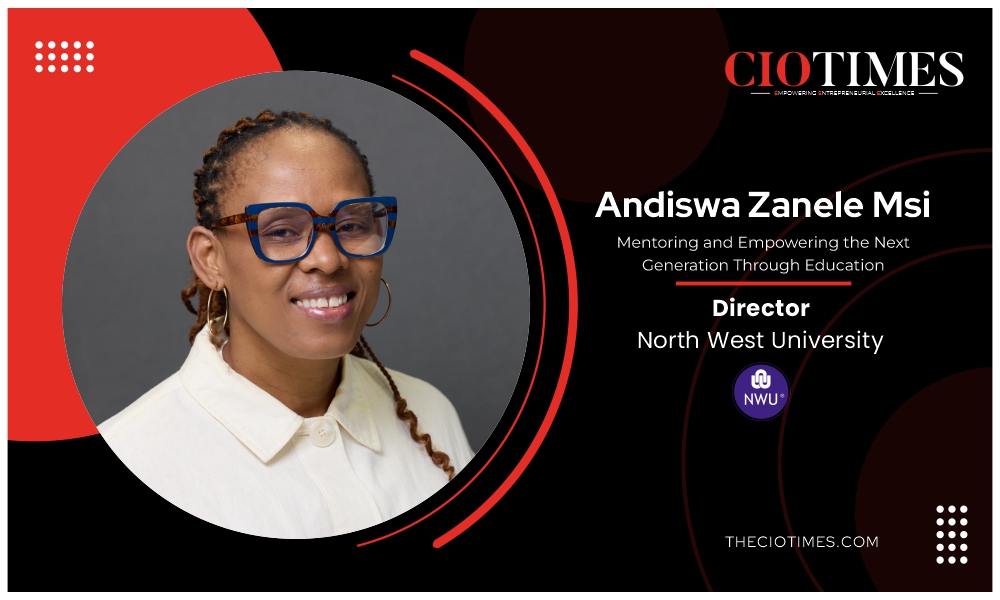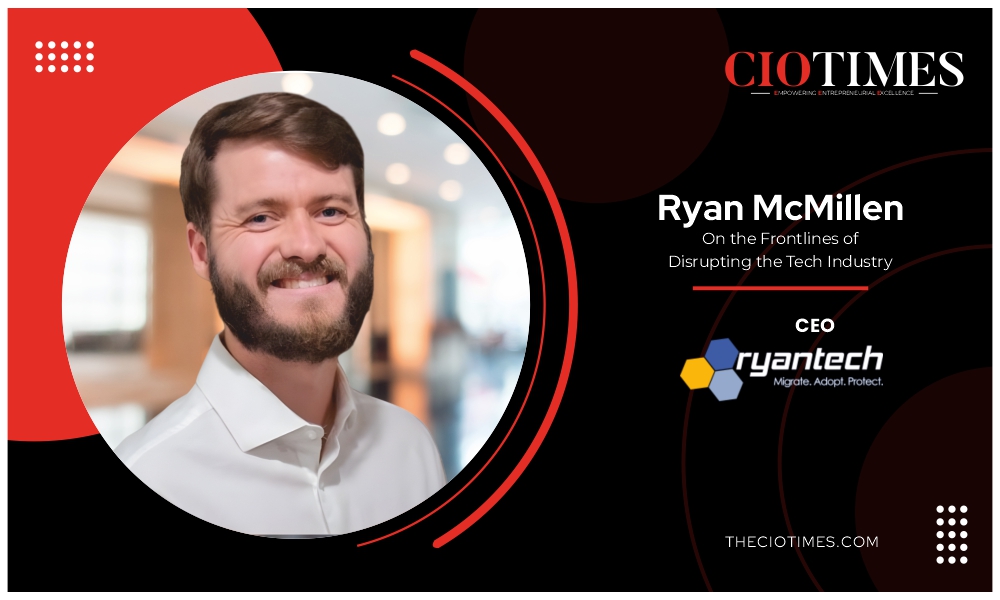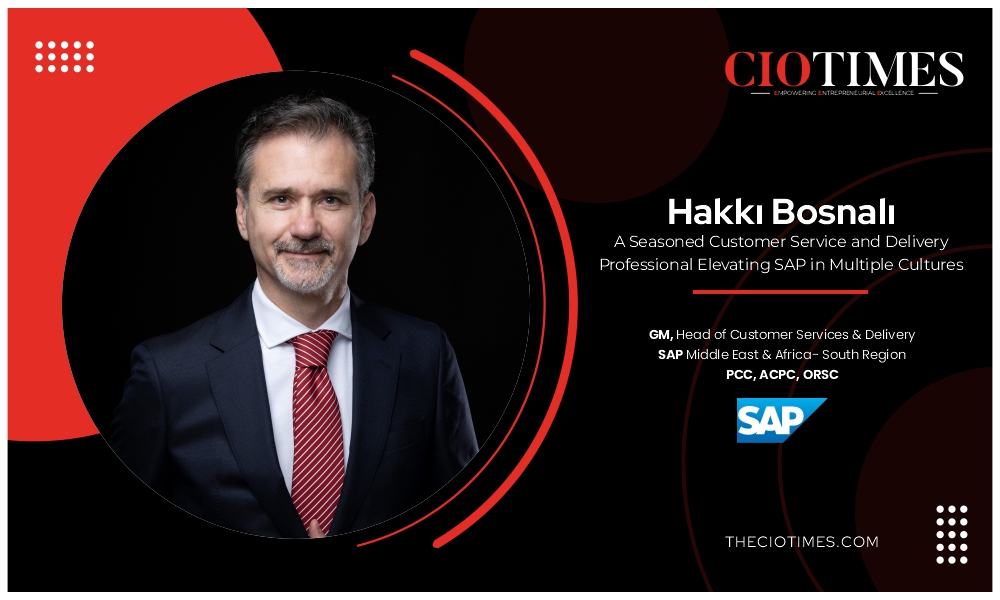With a strategic, forward-thinking approach to leadership, underpinned by a deep commitment to leveraging technology for educational and operational excellence, Andiswa Zanele Msi leads North-West University(NWU) as its Director of IT: Academic, Office & Workplace Solutions.
She is dedicated to pushing the boundaries of what can be achieved through digital innovation, ensuring that NWU maintains a competitive edge in the rapidly evolving higher education landscape. Her role is to not only manage and lead but also to inspire and transform, driving both technological and cultural shifts that foster a robust, innovative, and secure academic environment.
Diverse Roles in a Prolific Career
Over the years, Andiswa has also played many advisory roles across various industries, where her insights have helped shape IT governance frameworks and digital strategy implementations. These experiences have not only enriched her professional expertise but also enhanced her ability to lead diverse teams and manage complex, multi-dimensional projects that span technological, academic, and business domains.
Her career has been marked by substantial experience as a business owner and marketing strategist. This background endowed her with a robust entrepreneurial spirit and a deep understanding of market dynamics, enabling Andiswa to implement innovative solutions that address both immediate operational needs and long-term strategic goals. Her expertise in marketing and strategy has been instrumental in developing and leading several high-impact projects, programs, and portfolios that have significantly transformed business operations and driven growth.
Andiswa’s involvement in technology extends into several prestigious roles outside her direct professional commitments. She represents NWU on the Artificial Intelligence Working Group for the Digital Education Council and is an active faculty member of HEITSA. She also holds a seat on the NWU Senate, contributing strategic insights that shape the governance and future direction of the university. Furthermore, she participates in multiple working groups focused on key areas such as teaching and learning, research and innovation, and workplace productivity optimisation.
Cybersecurity is another critical area of her expertise. With numerous advanced courses in cybersecurity and cyberintelligence under her belt, Andiswa leads initiatives to bolster NWU’s defences against the evolving landscape of digital threats. This specialisation is complemented by her ongoing scholarly pursuits in digital transformation and the ethics of artificial intelligence, preparing her to tackle complex ethical dilemmas and technological challenges in the digital age.
The Institute
The North-West University (NWU) is a higher education institution in South Africa, known for its multi-campus structure and commitment to academic excellence, innovation, and social responsibility. With campuses in Potchefstroom, Mahikeng, and Van der Bijlpark, NWU offers a wide range of undergraduate, postgraduate, and research programs in fields such as education, health sciences, engineering, business, and natural sciences.
North-West University (NWU) stands as a beacon of higher education in South Africa, distinguished by its multi-campus structure and a steadfast commitment to academic excellence, innovation, and social responsibility. Positioned across Potchefstroom, Mahikeng, and Van der Bijlpark, NWU provides a comprehensive suite of academic offerings ranging from undergraduate to postgraduate degrees, alongside robust research programs in varied disciplines such as education, health sciences, engineering, business, and the natural sciences.
At the heart of NWU’s ethos are the core values of Integrity, Respect, Accountability, Excellence, and Care. These values guide daily operations and strategic decisions, ensuring ethical behaviour, mutual respect, transparency, and a commitment to high standards in teaching, research, and service. NWU prioritizes the well-being and development of its community.
The mission of NWU is to create a learning environment that empowers students to make meaningful societal contributions. The university aims to develop critical thinkers, innovative problem-solvers, and responsible citizens. This mission is reinforced by a dedication to research excellence and community engagement, extending NWU’s academic influence beyond its campuses.
Services
NWU offers a wide array of services designed to support our students throughout their educational journey:
Academic Support Services: Including tutoring programs, writing centers, and libraries, equipped with the latest resources to aid in student learning.
Career Services: Providing career counselling, job placement services, and networking opportunities to prepare students for professional success.
Health and Wellness Services: Offering counselling, health services, and wellness programs to support the physical and mental health of our community.
Research and Innovation Hubs: Facilitating cutting-edge research and collaboration with industry partners, fostering innovation that impacts both local and global communities.
Community Engagement Initiatives: Engaging students and staff in service projects that address local community needs, reinforcing our commitment to social responsibility.
Academic and Office Solutions at NWU
The Academic and Office Solutions (AOS) division at NWU has evolved in many ways over the years. To name a few: adopting cloud-based solutions, data-driven insights, and a user-centric approach to support the university’s digital transformation.
Moving newer implemented systems the cloud has enhanced flexibility, scalability, and collaboration across the NWU community, allowing both staff and students seamless access to resources. To encourage sustainable innovation, AOS has developed processes for piloting and integrating emerging technologies, such as AI, while maintaining a balance with core operations. This approach includes phased rollouts and continuous feedback loops to refine solutions and ensure alignment with NWU’s needs. By focusing on scalability, collaboration, and adaptability, AOS remains responsive to both immediate user needs and future technological advancements, positioning NWU at the forefront of digital transformation in higher education.
A Challenging Role
The challenges faced by Andiswa as the AOS (Academic and Office Solutions) Director are multifaceted, especially as the division plays a key role in enabling technology and supporting the digital transformation agenda. Highlighting a few:
- Effectively managing a distributed team with increasing reliance on hybrid work arrangements requires maintaining communication, fostering collaboration, and ensuring that staff are fully supported, despite being physically separated.
- While staff stability within the AOS division is generally high, the competitive nature of the technology sector makes talent acquisition and retention an ongoing challenge. The division must continue to attract skilled professionals and ensure that employees are satisfied and engaged to reduce turnover.
- As the AOS division’s portfolio continues to expand, ensuring adequate staffing levels becomes increasingly difficult. The absence of backup staff puts significant pressure on existing team members, often leading to resource strain and potential burnout.
- A primary focus for the AOS division is user satisfaction, which can be challenging as the technology landscape is constantly evolving. The division must stay on top of rapid changes in technology while ensuring that users continue to receive support and seamless experiences.
Technological challenges and organizational staffing concerns significantly impact her role in leading the team and supporting NWU’s broader objectives. Andiswa is an outgoing and creative individual who values open communication and collaboration, actively seeking feedback to enhance processes. She believes that addressing issues head-on is crucial for maintaining team morale, ensuring quick resolutions, and setting clear expectations and priorities. Emphasizing healthy boundaries helps reduce stress, prevent burnout, and maintain structure. By fostering respect for individual time and effort, she sees to it that team dynamics are strengthened. Effective feedback loops and regular reviews help her drive continuous improvement, refining strategies and processes. Encouraging a culture of open dialogue ensures concerns are addressed promptly, successes are celebrated, and team goals are achieved.
Integrating Technology and Innovation
At North-West University (NWU), integrating technology and innovation into academic and office solutions is a dynamic process that hinges on aligning the university’s technological advancements with its strategic goals. Its approach is comprehensive, focusing on understanding the needs of its users and the potential impacts of emerging technologies. Here’s how the institute manages this integration effectively:
- Alignment with Strategic Goals
The first step in integrating technology and innovation is to ensure that every initiative aligns with NWU’s overarching strategic goals. The team continuously evaluates how technology can enhance the core objectives, such as improving student outcomes, expanding research capabilities, and optimizing operational efficiency.
- Understanding User Needs
User-centric design is key. Andiswa and the team actively engage with students, faculty, and administrative staff to gather insights into their daily challenges and requirements. This ongoing dialogue helps them tailor their technology solutions to meet the actual needs of the community, ensuring that the tools they deploy improve their academic and administrative experiences.
Leveraging Emerging Technologies
North-West University (NWU) is at the forefront of integrating advanced technologies to enhance both academic and office operations. Our approach focuses on creating a seamless, efficient, and innovative environment conducive to learning, research, and administration. Here are key areas where technology is being leveraged:
- Artificial Intelligence (AI): AI is utilized in several facets at NWU, from powering data analytics tools that enhance decision-making to supporting personalized learning environments. AI-driven chatbots, for example, provide students with 24/7 assistance, answering queries related to courses, campus facilities, and administrative processes.
- Data-Driven Decision Making: NWU integrates systems that leverage big data to inform strategic decisions across the university. This involves using analytics to track and enhance student engagement, academic performance, and resource allocation. Predictive analytics are particularly important in identifying at-risk students and intervening proactively to support their learning journeys.
- Cloud Computing: Cloud-based solutions ensure that academic and administrative services are flexible, scalable, and accessible from anywhere. This is crucial not only for supporting remote learning and hybrid work models but also for facilitating collaboration and information sharing across different campuses.
- Learning Management Systems (LMS): We utilize state-of-the-art LMS platforms that enable interactive learning experiences, remote education, and effective course management. These platforms facilitate a blend of synchronous and asynchronous learning activities, making education more accessible and engaging for students across geographical boundaries.
- Digital Assessment Tools: To improve the assessment process, NWU has implemented digital tools that allow for the efficient creation, distribution, and grading of assessments. These tools also provide robust analytics that helps faculty understand student performance and tailor their teaching methods accordingly.
- Collaborative Platforms: Tools like Microsoft Teams and Google Workspace have been integral in fostering collaboration among students and staff. These platforms enable real-time communication, file sharing, and project management, which are essential for the hybrid models of work and learning that NWU supports.
- Artificial Intelligence (AI) and Machine Learning (ML): They are exploring AI and ML to automate routine administrative tasks and enhance decision-making processes. In academics, AI is being used to provide personalized learning experiences and support through chatbots and adaptive learning technologies.
- Robust Network Infrastructure: Understanding the critical role of reliable internet access, NWU has invested in robust network infrastructure that ensures high-speed connectivity across all campuses. This infrastructure supports the vast array of digital tools and platforms being used and is crucial for the smooth operation of both academic and administrative functions.
- Cybersecurity Initiatives: With the increase in digital operations, NWU places a high priority on cybersecurity. It employs advanced security measures, including multi-factor authentication, end-to-end encryption, and continuous monitoring systems to protect sensitive information and prevent data breaches.
Agile Implementation and Feedback Loops
Implementing technology solutions is an agile process at NWU. They prioritize flexibility to adapt quickly to new information or user feedback. After deploying a new tool or platform, they establish feedback loops that allow them to gather user insights and iteratively improve their solutions. This agility ensures that their technology remains relevant and effective.
- Training and Support
To maximize the adoption and effectiveness of new technologies, NWU invests in comprehensive training programs for all users, ensuring that they are proficient in the latest tools. Additionally, it provides ongoing support to address any issues that arise, minimizing disruptions to learning and administrative processes.
- Sustainability and Ethical Considerations
In all its technological implementations, NWU considers the sustainability and ethical implications of its choices. This includes selecting energy-efficient technologies, ensuring data privacy, and promoting digital literacy and ethics among its students and staff.
- Collaborative Innovation
Finally, NWU fosters a culture of innovation through collaborations with tech companies, other universities, and research institutions. These partnerships help us stay at the forefront of technological advancements and often lead to pilot projects that test cutting-edge solutions in a controlled environment before wider deployment.
“By integrating technology and innovation in these thoughtful and strategic ways, NWU continuously enhances its academic offerings and office operations,” says Andiswa.
Enabling Digital Transformation
Enabling Digital Transformation at NWU involves integrating technology to create dynamic learning environments with blended learning experiences. This approach accommodates various learning styles and needs through digital tools and platforms. Administrative functions are streamlined with automated systems for enrollment, records management, financial operations, and HR, improving efficiency and service delivery. High-performance computing and big data analytics facilitate advanced research, enhancing data analysis and fostering international collaboration. Communication and collaboration are revolutionized using platforms like Microsoft Teams and Google Workspace. Technology supports remote and hybrid learning models, ensuring uninterrupted education. Robust cybersecurity measures protect university data, while sustainability initiatives are supported through energy-efficient systems, digital documentation, and smart campus solutions, contributing to a greener university.
Driving Continuous Innovation
NWU’s commitment to technology is about more than just upgrading systems; it’s about embracing a culture of continuous innovation. We continually explore emerging technologies such as artificial intelligence, blockchain, and IoT to determine how they can further enhance academic excellence and operational efficiency.
Technology not only supports NWU’s strategic goals but is integral to creating a resilient and future-ready university. As we continue to expand our technological capabilities, the potential to transform educational experiences and administrative processes becomes even more profound, ensuring that NWU remains at the forefront of higher education institutions globally.
Strategies for Effective Management
Effective management of academic and office solutions at North-West University (NWU) is achieved through a strategic approach that integrates sustainability, security, and organizational alignment. This involves ensuring that all technological solutions align with the university’s broader objectives, supported by regular alignment sessions with stakeholders. Sustainability is prioritized by selecting scalable and cost-effective technology solutions that reduce environmental impact. Security measures, including multi-factor authentication and regular audits, safeguard sensitive information.
Agility is fostered through a culture of innovation and modular IT architectures, allowing for rapid adaptation to new challenges. Stakeholder engagement is maintained through regular communication, workshops, and feedback sessions, ensuring user needs are met. Continuous professional development and training enhance the effective use of technology, boosting productivity and maximizing investment returns.
Data-driven decision-making, guided by analytics on usage patterns and performance, helps improve solution effectiveness. Quality assurance and continuous improvement processes ensure the reliability and advancement of IT services, aligning with user expectations and technological developments. This comprehensive approach supports NWU’s mission of educational excellence and operational efficiency.
Mitigating Cybersecurity Threats as an Academic Institute
Academic institutions, with their vast repositories of sensitive data, are increasingly becoming prime targets for cyber-attacks. This susceptibility is compounded by the broad use of digital platforms for administrative and educational purposes. Andiswa points out that universities face several primary cybersecurity threats, including phishing attacks, ransomware, and data breaches. Phishing deceives users into providing credentials or clicking malicious links, while ransomware encrypts data, demanding payment for decryption. Data breaches expose sensitive information, leading to financial and reputational damage.
To mitigate these threats, a multi-layered security approach is essential. Implementing Multi-Factor Authentication (MFA) reduces unauthorized access risks, even if credentials are compromised. Firewalls and Intrusion Detection Systems (IDS) protect against unauthorized access and monitor network traffic for suspicious activity. Encrypting data at rest and in transit ensures intercepted data remains unreadable without decryption keys.
Cybersecurity awareness training educates staff, faculty, and students on best practices, including recognizing phishing emails and using strong passwords. Regular software updates and vulnerability patches protect against known exploits. Security audits and penetration testing identify and address vulnerabilities, while data access controls limit access based on user roles, reducing internal breach risks. By adopting these strategies, universities can enhance their cybersecurity posture and protect against evolving threats.
Exciting Opportunities
It is a growing portfolio and overlaps with all the other IT divisions – you have to think out of the box all the time. The digital future and all that it stands for is in itself exciting. Andiswa and her team are actively exploring the new MS365 environment, aiming to revolutionize data handling, collaboration, and communication, enhancing productivity and connectivity. The potential introduction of an innovative Learning Management System (LMS) promises more intuitive, flexible, and resource-rich platforms for students and faculty. We are investigating digital assessment tools for efficient, scalable, and secure student performance evaluations, offering personalized assessments and immediate feedback. Collaboration with business owners within the university ensures our IT solutions align with operational goals. The application of AI and machine learning enhances predictive analytics, personalized learning, and automated processes, significantly improving decision-making and efficiency. Virtual and Augmented Reality (VR/AR) holds the potential to create immersive learning environments, particularly in disciplines like medicine, engineering, and sciences. Sustainability initiatives promote practices reducing waste and energy consumption, while cybersecurity enhancements protect data and maintain trust. Together, these efforts support a more innovative, connected, and sustainable university environment.
Enriching the Community
North-West University (NWU) implements community-oriented educational programs that address local needs, equipping students with skills to positively impact their communities. They engage in service-learning, directly tackling community issues. Collaborations with local businesses, non-profits, and government agencies align NWU’s resources with community needs, fostering mutual growth. Research projects with direct community impact, such as those in public health and environmental conservation, inform local policies and lead to tangible benefits. NWU provides public access to resources like libraries and cultural events, promoting lifelong learning. Community engagement projects, ranging from health programs to business workshops, enhance local quality of life. The university supports technological education and innovation through training sessions and support for startups. Outreach services extend NWU’s expertise to the community, bridging academic knowledge with practical application. Lastly, sustainability initiatives promote environmental awareness and practices, ensuring long-term community health and prosperity.
A Word for Institutes Keen on Transformation
Andiswa advices that to drive digital transformation, institutions should embrace technological innovation by integrating emerging technologies such as cloud computing, AI, and advanced analytics to enhance efficiency and student engagement. Aligning technology with institutional goals ensures that each technological adoption supports the university’s strategic objectives. Identifying quick wins, like upgrading legacy systems or improving Wi-Fi, can swiftly boost efficiency and satisfaction. Investing in professional development for faculty and staff is crucial, with regular training to keep up with evolving technologies. Fostering a culture of continuous improvement through ongoing assessment and adaptation helps meet changing educational needs. Enhancing security measures is essential, with robust protocols and regular audits to protect sensitive information. Promoting collaboration and feedback by implementing systems that encourage input from all stakeholders ensures that technology meets user needs and aligns with strategic goals. These strategies collectively enable effective digital transformation in educational institutions.
Goals Ahead
Over the next five years, Andiswa’s vision for North-West University (NWU) is centred around several strategic objectives:
- Digital Transformation Leadership: Position NWU as a leader in digital transformation in the higher education sector. This involves not only enhancing our IT infrastructure but also integrating advanced digital tools across teaching, learning, and administrative domains.
- Advanced Research Capabilities: Enhance our research capabilities by leveraging big data analytics, AI, and machine learning to foster cutting-edge research that can compete on a global scale.
- Sustainable Technological Integration: Develop and implement a sustainable IT strategy that supports environmental, financial, and social sustainability, aligning with global sustainability goals.
- Comprehensive Cybersecurity Framework: Build a comprehensive cybersecurity framework that protects against evolving threats and ensures the integrity and security of our digital resources.
- Expand Global Partnerships: Forge strategic partnerships with leading global technology and educational institutions to enhance our curriculum, expand our research opportunities, and provide students and staff with international collaboration opportunities.
- Student-Centric Digital Services: Develop a range of student-centric digital services that enhance the student experience from admission to alumni engagement, ensuring that students receive personalised support and resources throughout their academic journey.
- Staff and Student Development: Continuously develop the skills of our staff and students in digital literacy, ensuring that they are equipped to meet the demands of an increasingly digital world. This includes integrating digital skills into curricula and providing ongoing professional development opportunities for staff.
Quote: “Success is not final, failure is not fatal: It is the courage to continue that count.” – Winston Churchill.
Quote: “NWU strives to be a leading institution not only in South Africa but globally, renowned for its academic rigour, innovative research, and the positive impact it has on society.”
Visit Andiswa Zanele Msi LinkedIn Profile
Visit all Exclusive Interviews




